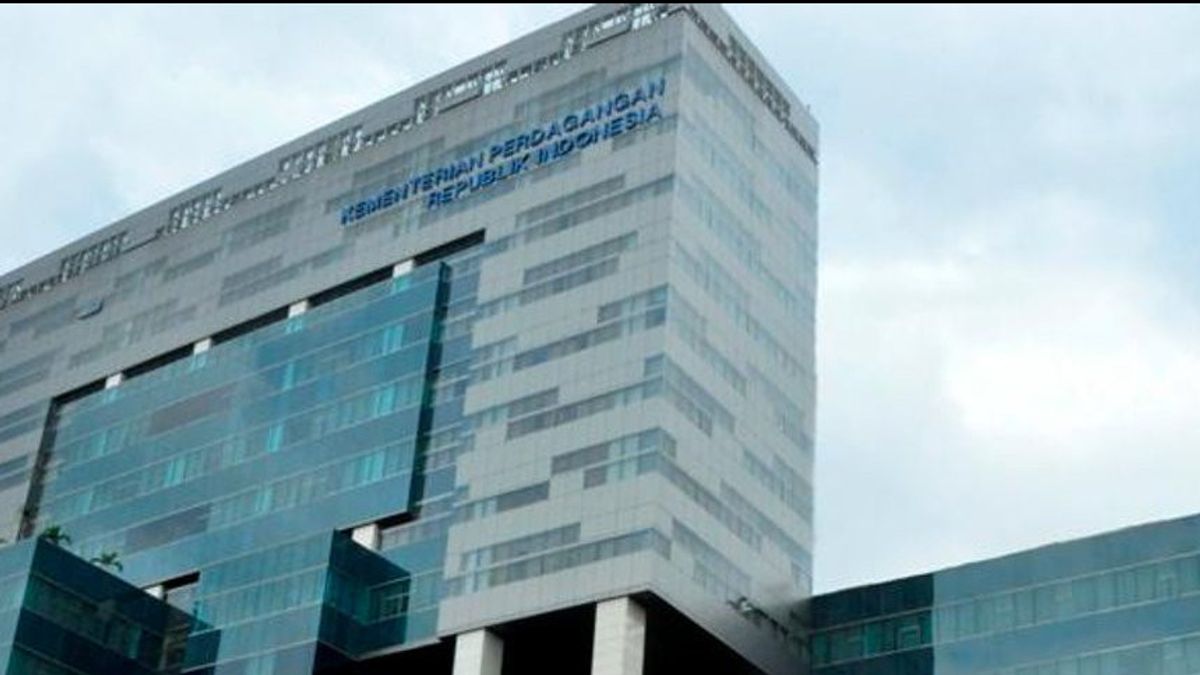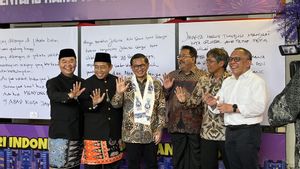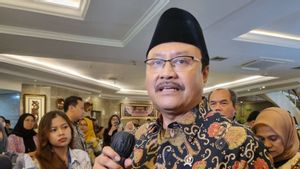JAKARTA - The director of export product development at the Ministry of Trade, Olvy Andrianita, said that the export market for halal products has not been widely touched. Even though Indonesia has succeeded in selling to Muslim (OIC) and non-Muslim countries.
Olvy said, there were five challenges that caused Indonesian halal products to find it difficult to compete in the global market. First, because the potential of the halal industry has not been optimized. Second, Indonesia has not focused on increasing exports of halal products.
"Indonesia is unable to compete with non-Muslim countries that develop similar products, such as Brazil, Africa and Thailand," he said at the ISEF event, Thursday, October 29.
Fourth, said Olvy, Indonesia is currently listed as the number 1 consumer of halal products. However, it is ranked 10th as a halal producing country in the world. So this is a challenge to change the paradigm of domestic halal industry players.
"We have to change the paradigm. We can export halal products to Muslim and non-Muslim countries because in non-Muslim countries there are many Muslim people who need halal, quality, and hygienic products," he said.
Based on the data presented, Olvy said, Brazil was in the first rank of food exporters to OIC countries by 10.51 percent, and Thailand 8.15 percent. Followed by Turkey 5.76 percent, India 5.5 percent, and China 4.97 percent. Meanwhile, Indonesia is still in the 20th rank, namely only 1.86 percent.
For cosmetic exports to OIC countries, France was in first place with a market share of 17.38 percent, followed by the United States with 7.57 percent, Germany 7.05 percent, Italy 5.5 percent, and China 5.08 percent. Meanwhile, Indonesia is in 23rd place, namely 1.41 percent.
Meanwhile, for the export of drugs, Germany was the country with the most number of positions in the first place with 13.8 percent, France 11.58 percent, Switzerland 9.4 percent, India 7.8 percent, and the US 6.9 percent. While Indonesia ranks 48, its market share is only 0.12 percent.
Even so, during 2015-2019, the trend of Indonesian food exports to OIC countries increased by 5.51 percent, medicines 4.76 percent, and cosmetics by 0.77 percent.
"Halal products at times like this are certainly more challenging than before the pandemic. Previously, the potential for the industry was easy to get raw materials, currently experiencing a little difficulty because there are several countries whose logistics are also disrupted. In Indonesia, our exports are also difficult to get ships. "he said.
Finally, said Olvy, the challenge faced is that there are still many business actors, especially MSMEs, that have not carried out halal certification. Not all business actors can get it because they are hampered by costs and tariffs.
"Halal certification is also not easy. Many business people, especially MSMEs, still have difficulty obtaining it, not with the product itself, not the halal. But whether the product is related to tariffs. This shows the parameters that the challenge exists," he explained.
Although there are many challenges that hinder the trade of Indonesian halal products, the potential is still there and very large if it is seriously developed. This opportunity can be seen from the increasing demand for global consumption of halal products.
"The Muslim community is also increasing. So if we pay attention, if we go abroad, we want to find halal products, it is not easy," he said.

Olvy said, this trend has made halal products more varied, which can be obtained through various trades, both offline and online. In addition, the Ministry of Trade has also entered into various international trade agreements to strengthen good and reciprocal relations with other countries.
The strategy undertaken by the Ministry of Trade to increase exports of halal products, said Olvy, with a focus on halal products made must refer to added value accompanied by food safety and halal content.
"For example, when you want to produce halal products, the Ministry of Trade and business people want to focus on the markets that are made to OIC and non-OIC. Non-OIC countries such as tourists and immigrants need halal products. This is an opportunity that must be taken," he said.
The Ministry of Trade, said Olvy, also has a program to increase competitiveness. One of them is strengthening the design for stronger product branding. The Ministry of Trade also gets around to penetrating the global market by forming a good Indonesian design. "We are also holding a trade expo. So the Ministry of Trade has done a lot," he explained.
The English, Chinese, Japanese, Arabic, and French versions are automatically generated by the AI. So there may still be inaccuracies in translating, please always see Indonesian as our main language. (system supported by DigitalSiber.id)













